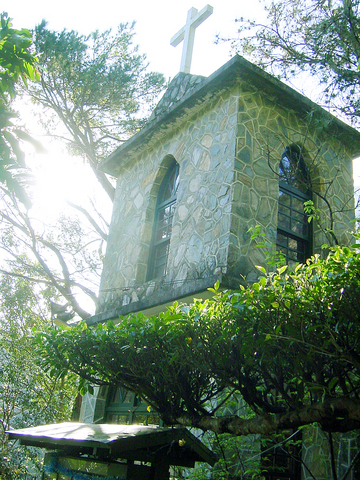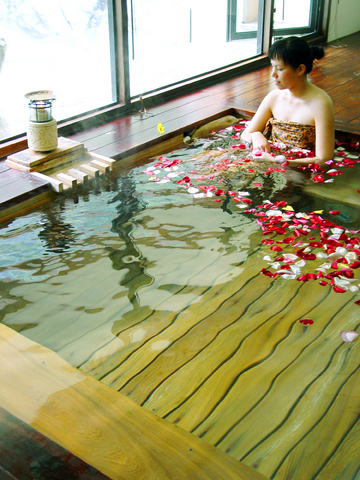As the warmth of spring has forced buds into blossoms and chirping insects out of the ground, the bustle of urban life seems out of tune with the season: Maybe a fresh dip into nature is what's needed. If that's what you have in mind, a trip to one of Taiwan's favorite tourist destinations would be a memorable weekend getaway.
Anyone who has been sightseeing in Taiwan has probably taken in the sights of the most-visited attractions at Taroko National Park such as Yantzukou (
Originally part of the Atayal tribe (泰雅族), the Taroko aboriginal groups' ancestors began their long journey to the east of the island about 300 years ago. Prompted to relocate due to the scarcity of hunting grounds in the west, they crossed the Central Mountain Range (中央山脈) and settled in the mountainous areas of Hualien. According to Simmone Kao (高曉慧), the executive secretary of the Grand Formosa Taroko (天祥晶華), though the Taroko groups share similar cultural customs with the Atayal, they developed their own distinctive language and culture as the groups lived in isolation from each other for hundreds of years.

PHOTO: HO YI, TAIPEI TIMES
The Tupido Tribe Trail was built by the Batto Bulego family of Taroko some 120 years ago, and now only parts of its ruins remain on the Tianhsyang mesa (
With this historical backdrop in mind, we began the two-hour hike setting off from the Tienhsiang tourist center near the Grand Formosa Taroko. Halfway through the historical trail, a monolith which overlooks Tienhsiang can be seen. It was the Tupido tribe's natural defense post and was garrisoned by young warriors.
When hiking up to the mesa, visitors will find the way lined with verdant bamboo.

PHOTO COURTESY OF GRAND FORMOSA TAROKO
Tupido is an Aboriginal term which refers to the native Formosa palm, which was historically abundant across mountain forests islandwide but has since become scarce. According to the guide from the Grand Formosa Taroko (
What the signs don't tell you is that you shouldn't enter the houses made of mud and brick to get a feel for the past. "The reason is that people in Taroko practiced indoor burial. So if you stand in the ruins, you are actually standing on top of the skeletons of their ancestors, which is not a good way to show your respect," Da Niu said.
At the center of the ruins lies another monolith, to the right of which lived the tribe's chieftain. "Taroko aborigines were headhunters. After a successful hunt, they would place the heads of their enemies at the chieftain's house and prepare a feast at the monolith ... Betel nuts were placed in the mouths of the severed heads so the dead wouldn't starve and their family wouldn't seek revenge," Da Niu explained.
Said to be belligerent and fierce in nature, the Taroko aborigines formed a highly united tribe and lived communally by sharing the land, harvests and livestock equably.
"One third of the mountain area in Taiwan was once the Taroko tribe's territories, but they were a rather melancholic lot, spending most of the time fighting with enemies and finding new lands. They are probably the only Aboriginal tribe in Taiwan that doesn't celebrate a type of harvest festival," Kao said.
Since the trail has a culturally rich heritage, it is advisable to take along a local guide. Gloves, long pants and long-sleeved shirts are recommended as the trail is sometimes hard going.
A holiday feels incomplete if it doesn't include gorging on quality food. For a picky gourmet, the seasonal special at the nearby Grand Formosa Taroko should satisfy his or her taste buds.
The hotel's chef has creatively used herbs and tea to craft a range of seasonal dishes.
While you are at the hotel, you may as well take full advantage of its five-star facilities, such as the spa where a body massage by the professional staff invigorates flagging holidaymakers.
But staying at a five-star hotel is too fancy for your holiday plan, there is alternative accommo-dation at the Leader Village Taroko, Bruwan Mesa (布洛灣). You will find no karaoke machines or computer games at the resort, since the owner's motto is to live according to nature. The resort can arrange one-day trips to most of the park's tourist attractions and eco-tourist night trips.
For your information:
Where to stay: The Grand Formosa Taroko in Hualien; special rates: NT$1,900 a night per person for each couple or NT$2,400 including breakfast, dinner and transportation to and from Hualien train station or airport. The rates are available until the end of May
Address: 18, Tianhsiang Rd, Hsiulin Village, Hualien County (花蓮縣秀林鄉天祥路18號)
Contact: (03) 869 1155
Web site: www.grandformosa-taroko.com.tw
Where to stay: Leader Village Taroko
Address: 232-1, Fushih Village, Hsiulin Township, Hualien, Taiwan County (花蓮縣秀林鄉富世村232-2號)
Contact: (03) 861 0111
Web site: www.leaderhotel.com

Taiwan has next to no political engagement in Myanmar, either with the ruling military junta nor the dozens of armed groups who’ve in the last five years taken over around two-thirds of the nation’s territory in a sprawling, patchwork civil war. But early last month, the leader of one relatively minor Burmese revolutionary faction, General Nerdah Bomya, who is also an alleged war criminal, made a low key visit to Taipei, where he met with a member of President William Lai’s (賴清德) staff, a retired Taiwanese military official and several academics. “I feel like Taiwan is a good example of

March 2 to March 8 Gunfire rang out along the shore of the frontline island of Lieyu (烈嶼) on a foggy afternoon on March 7, 1987. By the time it was over, about 20 unarmed Vietnamese refugees — men, women, elderly and children — were dead. They were hastily buried, followed by decades of silence. Months later, opposition politicians and journalists tried to uncover what had happened, but conflicting accounts only deepened the confusion. One version suggested that government troops had mistakenly killed their own operatives attempting to return home from Vietnam. The military maintained that the

Taipei Mayor Chiang Wan-an (蔣萬安) announced last week a city policy to get businesses to reduce working hours to seven hours per day for employees with children 12 and under at home. The city promised to subsidize 80 percent of the employees’ wage loss. Taipei can do this, since the Celestial Dragon Kingdom (天龍國), as it is sardonically known to the denizens of Taiwan’s less fortunate regions, has an outsize grip on the government budget. Like most subsidies, this will likely have little effect on Taiwan’s catastrophic birth rates, though it may be a relief to the shrinking number of

Since its formation almost 15 years ago, Kaohsiung rock band Elephant Gym (大象體操) has shattered every assumption about contemporary popular music, and their story is now on screen in a documentary titled More Real Than Dreams. It’s an unlikely success story that says a lot about young people in Taiwan — and beyond. For a start, their sound is analog. In the film, guitarist Tell Chang (張凱翔) proudly says: “There is no AI in our sound.” His sister, bass player KT Chang (張凱婷) is the true frontwoman — less for her singing abilities than for her thunderous sound on the instrument. Fast like